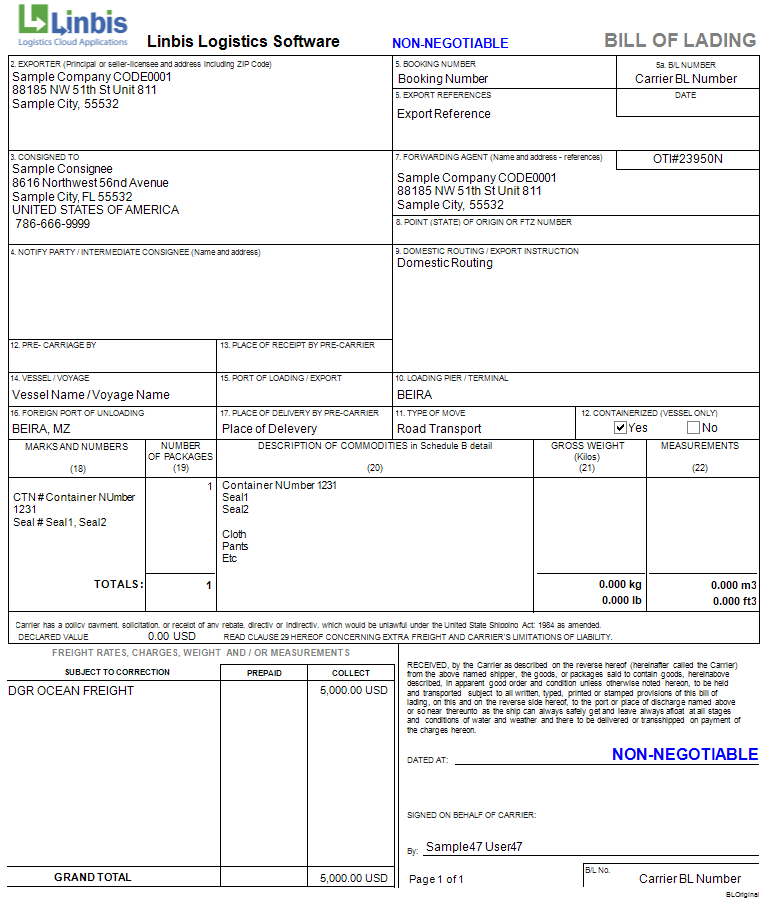Freight from the USA
|
|
|
|||
The ocean freight Bill of Lading (BOL, B/L, or consignment) is the mandatory document for international shipping from the USA by sea. The document is prepared and issued by sea carriers. Issuing of the document means that a load has been received on board as cargo for conveyance to a named place for delivery to the consignee.
Besides other points, the Ocean BOL serves the following purposes:
It is evidence of a contract of carriage between a carrier and the shipper.
It is a receipt for international shipping from the USA.
It is a title document for an imported commodity.
There are different types of bills of BOL cargo transportation for exporting goods from the U.S. Here are two of the most commonly used types of NON-NEGOTIABLE ocean B/Ls:
Express release BOL = Telex release = Surrender and;
Release endorsed upon a set of original BOL.
NON-NEGOTIABLE Bill of Lading: The document does NOT confer ownership of the transported cargo. The consignee (cargo recipient) named in the BOL must identify himself to claim the goods. Vs. NEGOTIABLE BOL issued "to the order of" is the title of the goods. I.e., a NEGOTIABLE Bill of Lading can be bought, sold, or traded while in transit.
EXPRESS RELEASE Bill of Lading means you do not have to provide the originals to claim your goods at the destination. Shipments on express release should be discharged at the destination upon surrendering a copy of the B/L. It should state: "ZERO (0) – NO ORIGINALS REQUIRED FOR RELEASE".
The statement "SET OF ORIGINAL REQUIRED" means that goods CANNOT be discharged to the consignee unless the consignee has surrendered a set of originals.

In our practice, all ocean freight carriers' Bill of Ladings are NON-NEGOTIABLE and ON EXPRESS RELEASES without prior agreement. We email copies of the express release B/L as PDF files.
Unless a set of originals is requested in advance, upon payment toward our invoices, we email carriers' BOLs to the parties paid for international shipping on or within a few days after the Estimated Date of Departure (ETD) of cargo from the USA. Sometimes, we invoice our customers based on the rated proofs of carriers' B/L. Refer to this step-by-step guide, step 5.
Upon receipt of a copy of the non-negotiable express release BOL, print it and keep it on record. Use it when you recover your goods at the destination.
Please note that several countries worldwide, particularly Argentina, Brazil, Ecuador, and certain African countries, DO NOT accept express release B/L. Sea carriers should specify this when issuing the B/L. It should appear on a B/L like this: "ORIGINALS RELEASED AT DESTINATION." In such cases, the original BOL will be generated at the destinations. I.e., issuing an original BOL during international shipping is unnecessary. If generating originals at designations is impossible, we will mail you a set of originals. USPS First Class Mail within the USA is free. Expedited or international mail must be prepaid.
If a customer requires a set of original B/L for shipments to a country that accepts express release, a $50 fee will be added to the carrier's freight cost. Postage must be prepaid. Issuing such sets of originals does not mean that the originals are required to discharge imported goods at the destination.
If an original BOL is required for international shipping from the U.S. but needs to be amended or lost, the carrier may request a LETTER OF INDEMNITY. Here is a link to a sample of the LETTER OF INDEMNITY for global cargo transportation from the USA.
Additional Notes on Sea Freight Bill of Lading
There are three main types of ocean BOLs, each serving a different purpose:
The type of B/L used determines how the load will be discharged at the destination and whether ownership can be transferred while the shipment is en route.
Beyond serving as a contract of carriage and receipt of goods, the BOL also functions as a document of title. This means the original document holder legally controls the right to claim the commodity. This function is critical in global transactions when the purchase is financed under a letter of credit.
In modern logistics, many ocean carriers offer a Telex Release (also known as an Express Release), which allows cargo to be discharged without surrendering an original document. This is especially useful when time is short or the original documents are not physically available at the destination.
However, if a shipment is under a negotiable BOL, an original document must be presented before the freight can be released.
A B/L must be consistent with the shipper’s commercial invoice, packing list, and booking information. If these documents don’t match, customs may hold the cargo, incur penalties, or refuse it to the consignee.
Moreover, the document is critical in legal disputes involving loss or damage. It serves as evidence of the condition and quantity of the cargo at the time of loading.
|
|